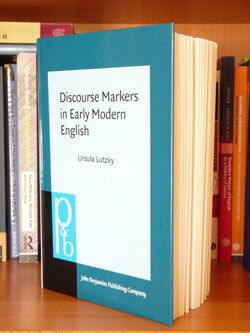University News Last updated 01 February 2013

A lecturer at Birmingham City University’s School of English is celebrating the publication of her latest book, Discourse Markers in Early Modern English.
Ursula Lutzky, Lecturer in English Language Studies at Birmingham City University, offers new insights into the nature of discourse markers used in Early Modern English (1500-1760). Discourse markers are, on the one hand, optional elements as they do not contribute to the meaning of a sentence and their omission does not render it ungrammatical. On the other hand, they have important functions which go beyond the level of the sentence, like for example introducing a new topic or expressing acknowledgement of what someone has said.
Discourse Markers in Early Modern English, which is based on Ursula's PhD project, contributes to the field of historical (socio)pragmatics. Ursula focuses in particular on three different forms, marry, well and why, looking at similarities and differences in their distribution and function in dialogues and other speech-related text types, like drama or personal letters. She also studies their use by male and female speakers as well as by members of different social classes to discover, for example, if women used these particles more often than men.
Ursula said: “I am very happy that my book has been published. As it is the first monograph on discourse markers in Early Modern English, I regard it as an essential contribution to the field of historical (socio)pragmatics. While it fills a gap, I also hope that it will inspire further studies so that we may reach a more comprehensive understanding of the use of discourse markers in the history of the English language.”
Ursula studied English, French and Finnish at the University of Vienna, where she completed her MA in English and French studies and her PhD in English linguistics. After working as a lecturer and research assistant at the English department of Vienna University (2005-2010), Ursula joined Birmingham City University in August 2010. She has presented and organised workshops at numerous international conferences, published in the field of her research interests and adopted several editorial responsibilities, having been a member of the editorial boards of the Vienna English Working Papers and Folia Linguistica Historica.
Ursula’s research interests include historical linguistics, (historical) (socio)pragmatics, corpus linguistics, and narrative analysis. She is currently collaborating with her Birmingham City University colleagues Andrew Kehoe and Matt Gee on a project about the language of blogs and with Robert Lawson on a project investigating interruptions and turn taking in Mock the Week.